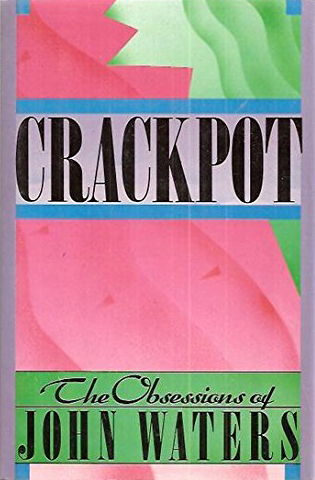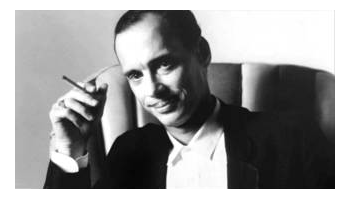© 1986 Rich Grzesiak, all rights reserved.
Director John Waters once told an interviewer that when he was filming Pink Flamingos he had to do something with a $10,000 budget that a major studio couldn't do with ten million dollars. So Divine ate dog shit.

Certainly, many untraditional filmgoers know who John Waters is and what he represents. For these hardy souls, his filmic adventures a la Pink Flamingos, Desperate Living, Polyester have virtually made him a god among the avant-garde. Now he's back with another film, an exercise called Hairspray, due for nationwide release in the first months of 1988.
Yet even if Waters were to never produce another film, his existing work has made him world famous and an inspiration to radical filmmakers everywhere. What self-respecting reader/midnight movie buff has not heard of, let alone seen, his world famous shockeroo films? Viva his entire oeuvre!
But there are those others who rebuke this decadent doyen of dirt as the "Prince of Puke," the "Pope of Bad Taste," and the pinnacle of all that is immoral in our culture.
He was all over the place when I interviewed him during the fall, 1986 promotion of his book Crackpot: The Obsessions of John Waters [Macmillan; $14.95/hardcover] 'cause the media blitz was on. (It anthologizes, like his earlier hilarious book Shock Value, some of his "alternative," as in outrageous commentary on popular culture and American social mores). For my money, when Waters writes, his innate and uncanny sense of the mondo bizarre makes him one of the most entertaining journalists describing our now declining world. Waters remains one of those hardy perennials who, no matter when one catches him, always winds up being interesting—an outrageous genius with the warm wit of a blue collar Vidal (though, in fact, he hails from a comfortably exurban background).
When I spoke to him by phone, he sounded pretty tired of the usual questions that mainstream journalists had been sending his way—no wonder, given the boring, Bryant Gumbel-flavored Today Show-type rap that must entail. So, I asked him all the obvious interrogatives those others of us would think of. And this is how it went:
Rich Grzesiak (RG): I feel like I'm about to reach you after a long series of interviews. Yes?
John Waters (JW): To be perfectly honest, I've been chatting constantly by phone with interviewers, and then, later this month I go on the road until the middle of November. Ugh! By the end of that period, the sound of my own voice might make me strangle myself every time I look in the mirror!
RG: My dear! What's your favorite cure for laryngitis?
JW: I've never really had that problem. I guess I can really talk a blue streak.
RG: What's been your worst interview ever?
JW: This morning I appeared on this amazing talk show put on by the Baltimore public school system—it was nothing but kids doing it. They were so much more professional than half the so-called real interviewers I've dealt with, you know.
But it reminded me of a really terrible experience I had somewhere in the Midwest when I was publicizing one of my movies. It was [an interview for] one of these morning talk shows. You walked onto the set—which was, of course, a kitchen—and there was this couple there who were The whole time she interviewed me the female half of the two breast fed her baby while she accused me of having bad taste.
All of this occurred, naturally on live TV. She had just had the kid, probably during an earlier live TV interview. I guess it was just supposed to be folksy or something.
It really took my breath away when she whipped her breasts out, because I hadn't been warned about it in advance. Then she proceeded to accuse me of doing such bad movies and having such terrible taste I thought to myself, well! I mean, you know, it was truly an amazing experience.
RG: If we were at Cambridge University, and you were sitting before an academic panel, could you formally define bad taste? Is bad taste something that can be defined? Is it a concept best expressed anecdotally? Do you have a formal definition for bad taste?
JW: To be honest, the words "bad taste," "sleaze" and all that I almost feel are dug in the ground. I'm a little weary of them because I've had to talk about them for so many years. I'm afraid they're losing their original meaning.

What I think it basically is [is people] delighting in things that generally don't know are in bad taste and think they're in good taste. That's the purest variety.
Mine [definition] is different in that I obviously, hopefully am having fun with it [bad taste].
The best kind is when people don't know. That variety is the most delightful.
But I think that you can't calculate it. Some of the things I see catching on these days in the world of fashion, home furnishings (pink flamingos on everybody's lawn, for god's sake)—I really think it's too forced. I personally gave away my pink flamingo collection 10 years ago, because it got to the point where everybody was giving me this stuff and I hated it.
Basically, the most important thing is to have fun with bad taste. I wish I had worked up a better definition it's really almost [like] having a professional interest in the subject anymore.
Generally, most of the public finds bad taste repulsive or distasteful or they're interested in stuff which they lack the nerve to admit.
RG: I ask my next question on bended knee, as I'm sure you've been asked it a hundred million times.
JW: [laughing] What the hell do you mean—are you going to ask me to marry you?
RG: [chuckling mirthlessly] No, I'm not like actress Zsa Zsa Gabor—I refuse to ask every other man to marry me!
JW: [defiantly charming] Just try to think up a question capable of offending me, John Waters.
RG: [in a formal tone reminiscent of Gregory Peck] No. The question is, what's happened to your once prolific film career? Why haven't we seen more flicks from you? Why aren't you making more films with Divine?
JW: [seriously, sounding like a cross between Barbara Stanwyck and Judy Garland] Well, I am making a film this coming spring [1987] which I imagine Divine will be in. We haven't gotten to all the contracts and agents and stuff
Basically after Polyester I tried to do a sequel to Pink Flamingos. I spent two years on the project. Nobody would give me the money [to do it] and then Edie ["the Egg Lady"] died.
When Edie died, I gave up on it, as she had a very large part, and I didn't feel she could be replaced.
It was probably a mistake, because nobody would give me the money. I think it would have minted money and been a good film, but maybe I'm wrong.
So that was two years ago. Then I wrote Crackpot: The Obsessions of John Waters. Still later I signed a development deal for a new movie which I have never talked about, and I'm still not going to, because I'm afraid it will curse it.
I went to an investment banker in New York. He liked the idea for this movie so he hired me to write it. So I wrote it, he likes the script, we're doing the budget now, and, knock on wood, we're going to shoot it in April.
RG: So this is an independent production company honchoing the deal?
JW: It's an independent firm. I go out to Hollywood lots of times, and I do the kitsch thing and I talk to agents and what always happens is—I understand why it happens, I'm not bitter at all—I get in the door because of Pink Flamingos and Polyester—and they like my ideas.
So, as soon as they see them, they freak out and that's it. So it gets me in the door and it keeps me out.
RG: Composer/diarist Ned Rorem quotes Cocteau on the topic of style: "'Fashion is beauty that becomes ugly. Art is ugliness that becomes beautiful.' Style applies to behavior more than to product; thus it's irrelevant to what, in the long run, counts." Are Rorem and Cocteau right?
JW: I agree with most of Rorem's comments. Like him, I think the Germans have lots of style but no charm. I think Rorem intellectualizes style a bit much for my taste.
RG: [sadly, like Jennifer Jones in The Song of Bernadette] I endured 8 years as a gay newspaper editor. During that period, a favorite complaint about your films from lesbian-feminists arose from your alleged misogyny in that the portrayal of women in your films is less than positive, to put it politely: "John Waters is a woman-hater par excellence who portrays the female condition in his flicks with a cunning disregard for feminist needs."
Are these womyn right?
JW: First of all, I've heard these criticisms before, but very seldom. It's always a teeny tiny little group that generally—if not oddly—emerges from gay women's groups, not straight women. The only time this has ever really happened was in Boston when Desperate Living premiered. It [emerged from] a gay newspaper generally run by men.
I was just amazed by it. I don't go along with any of that criticism. I don't think that I or my films demonstrate any hatred of women at all. I think that women are very strong characters in all of my films; men always have secondary parts. Every star I've ever used is a woman.
Many of the people who worked on my film Desperate Living were gay women: they came up with the bar [for that film and also] some of the costumes.
Remember, there are all different kinds of gay women. My women don't hate men. I find that generally the criticism I get from a certain gay group of people usually reduces to hatred of men or hatred of everybody who isn't gay.
I'm sorry, but I don't hate women or straight people. I don't think gay is either good or bad. I think you can be an asshole and be straight or gay.
Remember, most of my publicity gigs involve audiences that are half female.
RG: when not reminiscent of The Twilight Zone. Speaking of misogyny, why is Baltimore regarded as The International Hairdo Capital of the World?
JW: Well, hairdos were big here; there was a beauty parlor on every corner; beehives teased to the nth degree used to be very big.
That is a vanishing breed now. What has taken the beehive's place is the Farrah Fawcett hairdo from 10 years ago. Now you see that everywhere:—the Charlie's Angels do. You can walk into a McDonald's here and every person will have that hairdo. And if you say to them, "Hi, Farrah!" they say "Hi!" right back. It's like clock work.
So that's how it all began. Hairdos are so important here [in Baltimore] and still are.
RG: Speaking of hairdos, who has the better "do": Pia Zadora or Charo?
JW: [sounding pained, like Perry Mason unable to solve a case] Oh, really: Pia Zadora.
RG: [impatiently] Why?
JW: Because Pia changes and Charo is. I like Charo, I like the idea of Charo. I'm not so crazy about the idea of going to see Charo [perform] in Vegas. So I like the idea of Pia Zadora and her movies and I like to go see her performances.
And I think her hair is just all around better!
RG: Have you ever met Charo herself?
JW: No. As my book explains, I've met her plumber, who's really more important anyway.
RG: Charo is what we in the gay world might call a "wrinkle queen" in that she was married to geriatric Xavier Cugat for the longest period.
JW: Yes! They call these people gold diggers, too. And gold diggers are not "ageist," a word which I believe the S.L.A. coined.
RG: What would be the antonym for "pederast"?
JW: A "wrinkle queen," I think. Or a geronto-philiac. So, there's somebody for everybody, and I think that's great. I mean, there're very few 90 year olds you meet and fall in love [with].
RG: Have you ever been arrested?
JW: Oh, yes!
RG: Why?
JW: Never for anything all that serious. It always happened in my youth: underage drinking (three times) and drunk driving
RG: Why do "people look better in prison"?
JW: Because they're vulnerable and trapped and they've done something hideous, which I think all comes together for a good look.
RG: Does that make them look more fuckworthy?
JW: No, I don't mean that at all. They look more glamorous: they've got a story that I want to hear! A lot of them are not [physically] attractive at all.
But to me the most important thing goes beyond sex it's to be interested in hearing [about] somebody's life.
RG: I approach you now in your role as the "Pope of Bad Taste." Who is the tackiest actress alive today?
JW: Pia Zadora is my favorite trashy actress (I mean that complementarily). I can't think of her name, but it would have to be the woman who played a leading role in the TV sitcom WKRP in Cincinnati [Loni Anderson].
RG: What's the one question you dread being asked in interviews?
JW: "Where did you meet Divine?"—because I've told that story so many times. If I hear it [asked] again, I may just die.
RG: When I interviewed popular gay porno star Chris Burns, he complained of the increasing difficulty in lensing porno tapes. The Meese commission [on pornography] has had a really censorial effect on non-mainstream video/film work. Have they affected the distribution of your works?
JW: It hasn't hurt me at all in the movie business because, first of all, my films never play in porno theaters. They always play in theaters that the police would never bust.. The new censorship has probably hurt Pink Flamingos in video shops because many stores will not carry that film. There is even a list sent around by some video associations which says, if you don't want trouble, don't carry these 10 films.
This doesn't occur in Manhattan, obviously, but in a way it helps: It certainly helped Playboy in that it wasn't even controversial until this [Meese report] came out. Now, they've made Playboy forbidden again. All censors should just shut up, because as soon as they shitcan something, people want to run out and get it.
If pickets came to my films, I would be glad. When Hail, Mary played in Baltimore, I thanked the pickets afterwards for helping to publicize the film by getting it on all three local news shows—an obscure French art film that nobody knows enough to come to see.
So I can't figure that out. When you censor something, you don't mention it. They're helping to publicize what they started out to kill.
RG: In a June, 1986 issue of Vanity Fair, we learned that the late Duchess of Windsor would insist on having her toilet paper folded and placed on a tray by her bidet.
JW: Well, let's face it: when you're that bored and that rich, what else are you going to think up to do?
RG: What's your favorite story in The Weekly World News?
JW: I guess my favorite has to do with an item they ran last December when they claimed the Russians would blast Santa Claus right out of the sky. That one really sticks with me.
RG: If John Waters could order anyone to have sex with him, who would it be?
JW: Well, I probably wouldn't tell you because I wouldn't want them to read it in a paper. After all, that's hardly a successful way to come on to somebody.
RG: Do you have a sexual "type" that you like?
JW: No, I believe that your "type" never works. I certainly have had in my life somebody that I thought was my "type," but I really believe that when you think somebody is your type, it's doomed to not work.
